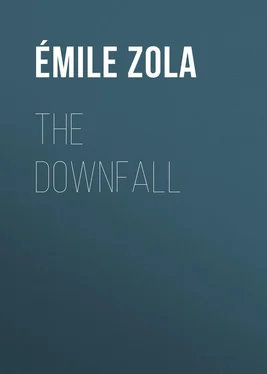Émile Zola - The Downfall
Здесь есть возможность читать онлайн «Émile Zola - The Downfall» — ознакомительный отрывок электронной книги совершенно бесплатно, а после прочтения отрывка купить полную версию. В некоторых случаях можно слушать аудио, скачать через торрент в формате fb2 и присутствует краткое содержание. Жанр: literature_19, foreign_antique, foreign_prose, на английском языке. Описание произведения, (предисловие) а так же отзывы посетителей доступны на портале библиотеки ЛибКат.
- Название:The Downfall
- Автор:
- Жанр:
- Год:неизвестен
- ISBN:нет данных
- Рейтинг книги:5 / 5. Голосов: 1
-
Избранное:Добавить в избранное
- Отзывы:
-
Ваша оценка:
- 100
- 1
- 2
- 3
- 4
- 5
The Downfall: краткое содержание, описание и аннотация
Предлагаем к чтению аннотацию, описание, краткое содержание или предисловие (зависит от того, что написал сам автор книги «The Downfall»). Если вы не нашли необходимую информацию о книге — напишите в комментариях, мы постараемся отыскать её.
The Downfall — читать онлайн ознакомительный отрывок
Ниже представлен текст книги, разбитый по страницам. Система сохранения места последней прочитанной страницы, позволяет с удобством читать онлайн бесплатно книгу «The Downfall», без необходимости каждый раз заново искать на чём Вы остановились. Поставьте закладку, и сможете в любой момент перейти на страницу, на которой закончили чтение.
Интервал:
Закладка:
It was about one o’clock in the morning when it came Maurice’s turn to take his post as sentry at the edge of an orchard of plum-trees, between the road and the river. The night was black as ink, and as soon as his comrades left him and he found himself alone in the deep silence of the sleeping fields he was conscious of a sensation of fear creeping over him, a feeling of abject terror such as he had never known before and which he trembled with rage and shame at his inability to conquer. He turned his head to cheer himself by a sight of the camp-fires, but they were hidden from him by a wood; there was naught behind him but an unfathomable sea of blackness; all that he could discern was a few distant lights still dimly burning in Vouziers, where the inhabitants, doubtless forewarned and trembling at the thought of the impending combat, were keeping anxious vigil. His terror was increased, if that were possible, on bringing his piece to his shoulder to find that he could not even distinguish the sights on it. Then commenced a period of suspense that tried his nerves most cruelly; every faculty of his being was strained and concentrated in the one sense of hearing; sounds so faint as to be imperceptible reverberated in his ears like the crash of thunder; the plash of a distant waterfall, the rustling of a leaf, the movement of an insect in the grass, were like the booming of artillery. Was that the tramp of cavalry, the deep rumbling of gun-carriages driven at speed, that he heard down there to the right? And there on his left, what was that? was it not the sound of stealthy whispers, stifled voices, a party creeping up to surprise him under cover of the darkness? Three times he was on the point of giving the alarm by firing his piece. The fear that he might be mistaken and incur the ridicule of his comrades served to intensify his distress. He had kneeled upon the ground, supporting his left shoulder against a tree; it seemed to him that he had been occupying that position for hours, that they had forgotten him there, that the army had moved away without him. Then suddenly, at once, his fear left him; upon the road, that he knew was not two hundred yards away, he distinctly heard the cadenced tramp of marching men. Immediately it flashed across his mind as a certainty that they were the troops from Grand-Pre, whose coming had been awaited with such anxiety – General Dumont bringing in Bordas’ brigade. At that same moment the corporal of the guard came along with the relief; he had been on post a little less than the customary hour.
He had been right; it was the 3d division returning to camp. Everyone felt a sensation of deep relief. Increased precautions were taken, nevertheless, for what fresh intelligence they received tended to confirm what they supposed they already knew of the enemy’s approach. A few uhlans, forbidding looking fellows in their long black cloaks, were brought in as prisoners, but they were uncommunicative, and so daylight came at last, the pale, ghastly light of a rainy morning, bringing with it no alleviation of their terrible suspense. No one had dared to close an eye during that long night. About seven o’clock Lieutenant Rochas affirmed that MacMahon was coming up with the whole army. The truth of the matter was that General Douay, in reply to his dispatch of the preceding day announcing that a battle at Vouziers was inevitable, had received a letter from the marshal enjoining him to hold the position until re-enforcements could reach him; the forward movement had been arrested; the 1st corps was being directed on Terron, the 5th on Buzancy, while the 12th was to remain at Chene and constitute our second line. Then the suspense became more breathless still; it was to be no mere skirmish that the peaceful valley of the Aisne was to witness that day, but a great battle, in which would participate the entire army, that was even now turning its back upon the Meuse and marching southward; and there was no making of soup, the men had to content themselves with coffee and hard-tack, for everyone was saying, without troubling himself to ask why, that the “wipe of the dish-clout” was set down for midday. An aide-de-camp had been dispatched to the marshal to urge him to hurry forward their supports, as intelligence received from every quarter made it more and more certain that the two Prussian armies were close at hand, and three hours later still another officer galloped off like mad toward Chene, where general headquarters were located, with a request for instructions, for consternation had risen to a higher pitch then ever with the receipt of fresh tidings from the maire of a country commune, who told of having seen a hundred thousand men at Grand-Pre, while another hundred thousand were advancing by way of Buzancy.
Midday came, and not a sign of the Prussians. At one o’clock, at two, it was the same, and a reaction of lassitude and doubt began to prevail among the troops. Derisive jeers were heard at the expense of the generals: perhaps they had seen their shadow on the wall; they should be presented with a pair of spectacles. A pretty set of humbugs they were, to have caused all that trouble for nothing! A fellow who passed for a wit among his comrades shouted:
“It is like it was down there at Mulhausen, eh?”
The words recalled to Maurice’s mind a flood of bitter memories. He thought of that idiotic flight, that panic that had swept away the 7th corps when there was not a German visible, nor within ten leagues of where they were, and now he had a distinct certainty that they were to have a renewal of that experience. It was plain that if twenty-four hours had elapsed since the skirmish at Grand-Pre and they had not been attacked, the reason was that the 4th hussars had merely struck up against a reconnoitering body of cavalry; the main body of the Prussians must be far away, probably a day’s march or two. Then the thought suddenly struck him of the time they had wasted, and it terrified him; in three days they had only accomplished the distance from Contreuve to Vouziers, a scant two leagues. On the 25th the other corps, alleging scarcity of supplies, had diverted their course to the north, while now, on the 27th, here they were coming southward again to fight a battle with an invisible enemy. Bordas’ brigade had followed the 4th hussars into the abandoned passes of the Argonne, and was supposed to have got itself into trouble; the division had gone to its assistance, and that had been succeeded by the corps, and that by the entire army, and all those movements had amounted to nothing. Maurice trembled as he reflected how pricelessly valuable was every hour, every minute, in that mad project of joining forces with Bazaine, a project that could be carried to a successful issue only by an officer of genius, with seasoned troops under him, who should press forward to his end with the resistless energy of a whirlwind, crushing every obstacle that lay in his path.
“It is all up with us!” said he, as the whole truth flashed through his mind, to Jean, who had given way to despair. Then as the corporal, failing to catch his meaning, looked at him wonderingly, he went on in an undertone, for his friend’s ear alone, to speak of their commanders:
“They mean well, but they have no sense, that’s certain – and no luck! They know nothing; they foresee nothing; they have neither plans nor ideas, nor happy intuitions. Allons ! everything is against us; it is all up!”
And by slow degrees that same feeling of discouragement that Maurice had arrived at by a process of reasoning settled down upon the denser intellects of the troops who lay there inactive, anxiously awaiting to see what the end would be. Distrust, as a result of their truer perception of the position they were in, was obscurely burrowing in those darkened minds, and there was no man so ignorant as not to feel a sense of injury at the ignorance and irresolution of their leaders, although he might not have been able to express in distinct terms the causes of his exasperation. In the name of Heaven, what were they doing there, since the Prussians had not shown themselves? either let them fight and have it over with, or else go off to some place where they could get some sleep; they had had enough of that kind of work. Since the departure of the second aide-de-camp, who had been dispatched in quest of orders, this feeling of unrest had been increasing momentarily; men collected in groups, talking loudly and discussing the situation pro and con, and the general inquietude communicating itself to the officers, they knew not what answer to make to those of their men who ventured to question them. They ought to be marching, it would not answer to dawdle thus; and so, when it became known about five o’clock that the aide-de-camp had returned and that they were to retreat, there was a sigh of relief throughout the camp and every heart was lighter.
Читать дальшеИнтервал:
Закладка:
Похожие книги на «The Downfall»
Представляем Вашему вниманию похожие книги на «The Downfall» списком для выбора. Мы отобрали схожую по названию и смыслу литературу в надежде предоставить читателям больше вариантов отыскать новые, интересные, ещё непрочитанные произведения.
Обсуждение, отзывы о книге «The Downfall» и просто собственные мнения читателей. Оставьте ваши комментарии, напишите, что Вы думаете о произведении, его смысле или главных героях. Укажите что конкретно понравилось, а что нет, и почему Вы так считаете.












